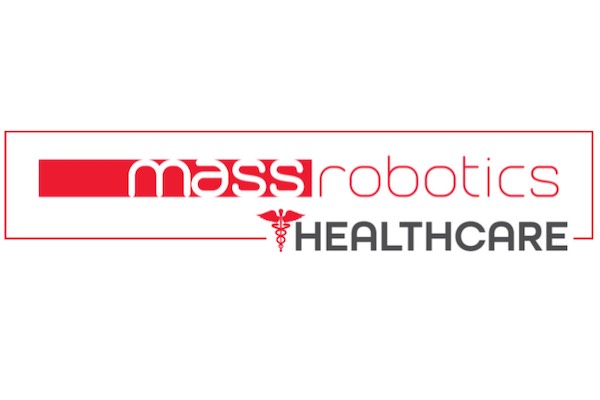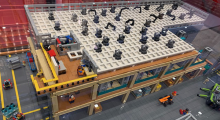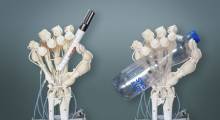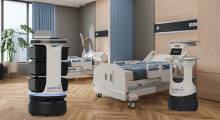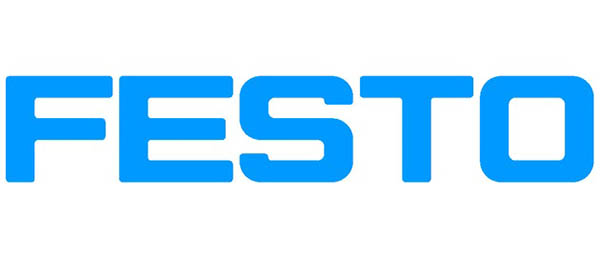Festo and MassRobotics announced that the Healthcare Robotics Startup Catalyst program ended on April 7, 2022. The organizations plan to hold a concluding ceremony in Boston on May 11.
“I am impressed with the quality of applications we received, and the unique structure of the program that allowed us to select such innovative companies and match them with world-class advisors,” said Alfons Riek, vice president of technology and innovation at Festo. “Certainly, we are excited about the networking opportunities opened to these companies and to presenting them to the world as great examples of the power of utilizing robotics in healthcare.”
Esslingen am Neckar, Germany-based Festo said it has led industrial automation, technical education, and sustainable development since its founding in 1925. The company supplies pneumatic and electrical systems to 300,000 customers in more than 35 industries.
Festo said it has about 20,000 employees in over 250 branch offices in 61 countries. The company reported a turnover of about €2.84 billion ($3 billion U.S.) in 2020 and said it invests about 8% of its net sales income in research and development. It invests another 1.5% of its annual turnover in training. Festo Didactic SE offers technical education and training to customers worldwide through physical and digital offerings.
Festo, MassRobotics nurture healthcare startups
The life sciences sector is becoming increasingly important, noted Festo. The company provides medical technology, laboratory automation, and services in 176 countries.
In October 2021, MassRobotics, Festo, and other industry players launched a Startup Catalyst Program to advance healthcare robotics startups around the world. They provided networking opportunities, guidance, and resources to help the companies grow and succeed.
The aim of the program was to connect healthcare robotics startups with customers, investors, suppliers, marketing, and overall support. The catalyst focused on startups in the areas of clinical care, public safety, laboratory, supply chain automation, out-of-hospital care, and quality of life. It also addressed continuity of work and education, as well as training and support for healthcare professionals.
More than 30 companies from around the world applied, and the selection committee invited four to join in the program. The participating startups completed impressive milestones, said Festo and MassRobotics.
Eureka Robotics develops and commercializes robotics and artificial intelligence to automate high-accuracy, high-agility tasks. The Singapore-based company is currently completing fundraising rounds in Japan through connections provided by program mentors.
MassRobotics introduced Eureka to partner Mitsubishi Electric, and the startup signed an agreement with Mitsubishi as a gobal platinum partner. The program helped Eureka’s leadership to explore applications in surgical lens manufacturing, which is an extension of its focus on traditional manufacturing.
Bionomous provides laboratory equipment to automate the screening, sorting, and pipetting of miniature biological entities for more ethical and faster research in life science.
CEO Frank Bonnet said that with the aid of the Catalyst Program, Bionomous was able to run a pilot program in the U.S., leading to the company’s first sales outside Europe. This convinced Bionomous to expand into the U.S. market and set up offices in the MassRobotics space in Boston.
Bonnet emphasized the importance of the program’s mentors, who connected his company to key industry leaders to open possibilities for future partnerships.
Assistive Technology Development Inc. (ATDev) is a startup dedicated to at-home physical therapy systems that are operable at a low cost and accessible to rural patients and those who need closer monitoring for recovery.
The Timnath, Colo.-based company said it came into the program with three goals:
- Begin its first pilot study in a clinical setting
- Downsize the actuation unit to a wearable form
- Raise capital
CEO Todd Roberts noted that with help from the program, ATDev has completed the first two milestones and is making progress on the third. It will begin Phase I of a pilot study with UCHealth, a not-for-profit health care system headquartered in Aurora, Colo. This will allow Assistive Technology Development to present preliminary results.
The study will assess the early clinical efficacy and collect patient and clinician feedback. ATDev said it has reduced its actuation unit by 70% from a large, wall-powered, benchtop system to a wearable, battery-powered system that will enable it to complete the pilot.
In addition, the company is in the process of raising capital and has begun diligence with two firms.
Kinarm uses robotic arms to provide an objective assessment method to identify, measure, and track cognitive motor or sensory impairments resulting from injury or disease. The Kingston, Ontario-based startup worked with assigned mentors from the robotics ecosystem who provided introductions to industry leaders who responded with “jaw-dropping, you-can-do-that?” exclamations, recalled Anne Vivian-Scott, CEO.
Vivian-Scott was also introduced to experienced healthcare robotics leaders who will collaboratively aid Kinarm as the company scales its systems.
“What we gained was not specific knowledge that can be encoded into our product, but direction,” she said. “Quite frankly, most other programs are not ‘sufficiently vested’ in the participant’s business/opportunity to be able to offer such feedback.”
MassRobotics salutes startups, looks ahead
The conclusion of the Healthcare Robotics Startup Catalyst program will be celebrated at the Boston Convention and Exhibition Center. The speakers will include the following people:
- Fady Saad, co-founder and vice president of strategic partnerships at MassRobotics
- Alfons Riek, vice president of technology and innovation at Festo
- Kendalle Burlin O'Connell, president and chief operating officer of MassBio
- Kenn Turner, president and CEO of Mass Life Sciences Center
- Brian Johnson, president of MassMedic
All four selected startups will present their products and services at next month's Healthcare Robotics Engineering Forum.
“I am grateful to Festo’s pioneering work to support our efforts to find global disrupting applications and startups in such a human-care field like healthcare, including life science, biotech, and medical devices,” said Saad.
A group of engineers, rocket scientists, and entrepreneurs came together to build MassRobotics, an innovation hub and startup cluster focused on the needs of the Massachusetts robotics and Internet of Things (IoT) community. The organization said it is helping robotics and connected devices companies to scale up. It said it provides startups access to workspace and the resources they need to develop, prototype, test, and commercialize their products.
MassRobotics, Festo, and additional corporations said plan to launch a second version of the Healthcare Robotics Catalyst by July 2022 to build on the program's momentum and impact.
Article topics
Email Sign Up

